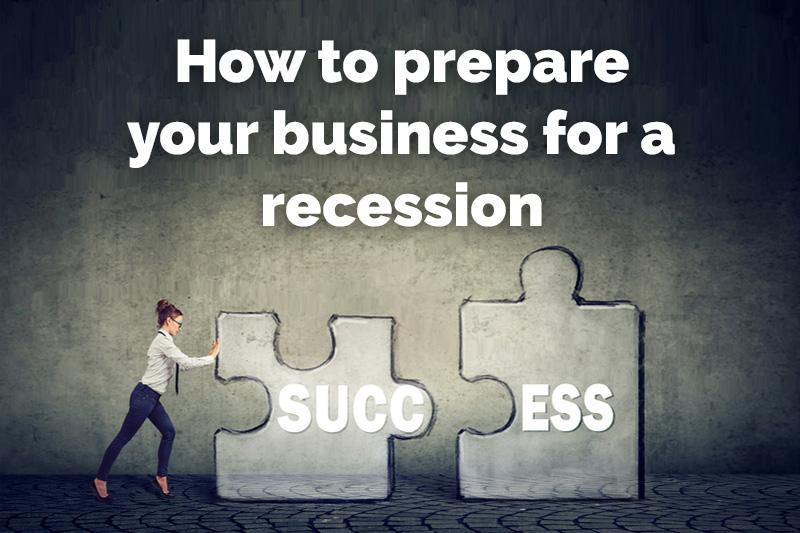
As a recession looms near, this guide will help you weather the storm and build a better business. Focus on building a cash reserve, decreasing your expenses, strengthening your relationships, refining your business offering, and continued marketing. While these are always good rules for a thriving company, they are even more important now.
How did we get here?
Our economy has had tremendous growth over the past 10 years, with huge gains in the stock market and low unemployment rates. Even before the pandemic hit though, we were seeing warning signs that a recession was coming with the inverted yield curve, low federal funds rate, and other economic indicators. As a normal part of the economic cycle, this was an expected correction but has been accelerated as most of our students are staying home from school, events have been canceled, restaurants/bars have closed, and communities are staying indoors.
Prepare for more hard times.
Although the markets have already dropped quite a bit, with all the businesses having to temporarily close or reduce their operations, our economy will only get worse. As I’m writing this, there are government stimulus packages being proposed but realistically these measures will just slow the recession, not stop it. I really hope that I’m wrong about this but looking at past recessions, our ongoing fight against this pandemic, and current momentum, we really need to be ready to weather the storm.
Hope for the best but prepare for the worst.
So how can a business prepare for a recession or even grow during a recession? By streamlining your business and focusing on what works, you’ll have a stronger, more stable company that can survive and even thrive.
Build a cash reserve.
A cash reserve is simply money that you have stored away, either in a bank account or money market account, that you don’t ever touch unless you absolutely have to. You should have enough cash available to pay for all your expenses for 3 months, although a larger reserve would be even better. Even if your business is profitable and has a good cash flow, having a 3-month cash reserve can make the difference between whether you close up shop or not.
If you don’t already have a cash reserve, the best time to start is now. By increasing cash flow and decreasing expenses, you can commit to making regular deposits into a money market, checking, or best a savings account. I prefer high yield accounts since they make more money and are still FDIC insured. For this, I personally use Robinhood’s cash management account (0.30% APY) but also recommend the Capital One Business Advantage Savings account (2% APY first year). For comparison, the traditional savings account only pays 0.09% APY.
An alternative to a cash reserve is to build up your credit line. Call your financial institution and open a line, making sure that it’s a low APR. If you already have a line, ask for an increase in the limit. Remember though that with these, you will have to pay the line back if you use it, and that comes with interest.
Lastly, by collecting your receivables sooner and paying your payables later, you almost instantly get more cash on hand. Since you’d be getting payments from your customers sooner and paying your bills later (but before any late charges), you’ll have money to invest into your cash reserve.
Remember, this reserve should only be used in case of emergency and only as a last resort.
Decrease your expenses.
Usually, the easiest way to increase profits is to reduce expenses. That’s easier said than done since everything can seem like a necessity.
- First, review your financials and audit your expenses. What are you spending money on currently? Are there discretionary expenses that you really don’t need? These could include extra meals or entertainment, subscriptions that aren’t really needed, drinks etc.
- For the items that you do need like office supplies, website hosting, or services, can you get them elsewhere cheaper?
- If you need furniture, can you buy used?
- Call your landlord and see if you can negotiate a cheaper rent.
- If you pay for utilities, how can you lower the costs?
- Lastly, review your employees and contractors. You’ll notice that I’m listing this last. Your employees are the lifeblood of your business and you should treat them as good or better than your customers. Even though they’re almost family, the hard truth is that your business NEEDS to come first. If you can drop hours down from full-time to 4-days a week, do so first. However, if you make cuts, make sure that it’s nonessential staff and that you only cut once. Cut deep and cut soon, thereby letting the rest of your staff know that their jobs are safe and so you all can come together as a team.
Strengthen your relationships.
If the recession deepens, you will need to make tough decisions and so will your customers.
Even though these times may be stressful, make sure to be thankful for your customers and go the extra mile with your best customers. Make it a point to be responsive and hear what they need most. Send them a note or call them to see how they’re doing and if there’s anything you can help them with. When your customers receive a more personal touch, they’ll be more likely to keep with you during these tough times. At this time, you’ll want to focus on your good customers but try to also transition problem customers away nicely (you don’t want negative reviews).
 You should treat your employees as well or better than your customers. That respect and attitude you show your employees will be show in how they interact with customers and they will go the extra mile for you. Let your team know that you’re doing everything you can for them and that you’re looking out for them. Even if you have to make cuts, let them see you take a salary cut as well so they know you’re all in it together.
You should treat your employees as well or better than your customers. That respect and attitude you show your employees will be show in how they interact with customers and they will go the extra mile for you. Let your team know that you’re doing everything you can for them and that you’re looking out for them. Even if you have to make cuts, let them see you take a salary cut as well so they know you’re all in it together.
Reach out to possible partners as well, and accept invitations for partnerships. Obviously, there’s a lot of spam out there so I’m just talking about legitimate connections. You may find a partner that can help your business and theirs at the same time.
Make sure to also nurture your online and social community. You don’t need to post all the time but people appreciate seeing the personal face of the company and will respond positively when they see you posting.
Refine your business offering.
Take a look at your financials to see which areas produce the most value in your business. These would be areas that either create a lot of revenue or are a core offering or give you a competitive advantage. Focus on these areas and drop unprofitable products and services.
At the same time, look at what competitors are doing and see if there’s ways you can improve your business through streamlined processes, new technology you can leverage, or new products and services that can better serve your customers, especially during these times. Are there opportunities where you could leapfrog your competition?
Speaking of technology, are there services or software that you can leverage to streamline your processes; perhaps a solution to better manage your customer relationships, help manage projects, or streamline your invoicing? By reducing the time your business spends on management or clerical tasks, you’ll have more time to spend on your core offerings. Partnerships can also help in this regard. For example, we work with a third-party payroll partner and accountant to free up our time.
Continue your marketing efforts.
 As you refine your business and focus on customer relationships, you’ll want to update your marketing messaging. Review how you are currently marketing to determine what’s working and what isn’t both in terms of reach and cost. Here’s a few ideas of how you can quickly expand your marketing efforts while being mindful of the expense.
As you refine your business and focus on customer relationships, you’ll want to update your marketing messaging. Review how you are currently marketing to determine what’s working and what isn’t both in terms of reach and cost. Here’s a few ideas of how you can quickly expand your marketing efforts while being mindful of the expense.
- Let’s start with your website since that should be the home-base for all online marketing. How old is your website? You’ll need a mobile-friendly, secure website to rank on Google. You may need a redesign. Or if you’ve recently updated your site, you’ll want to optimize it so that it loads quickly and make sure that it funnels visitors to your offerings – that it converts visitors into sales.
- Do you have a blog? Google loves content so you should be writing articles about topics that your customers would be interested in. You should be writing on a regular basis, at least twice a month. If you can’t commit to this, hire a content writer or company to help.
- Post on social media. Depending on your business, Facebook, Twitter, Instagram, LinkedIn, Pinterest, or YouTube may be appropriate. If you can’t consistently post on multiple platforms, focus on one and do it well. Again, you can contract help with this.
- Implement Google Analytics and a customer relationship management system (CRM). By tracking visitor behavior on your website, you can see what’s working and what’s not.
- Optimize your local Google listing and get 5-star reviews from your customers.
- Start a mail campaign. If you have a CRM, you may already have this. Send out updates and promotions to members of your mailing list.
- Run paid ads. Both Google Ads and Facebook Ads both allow you to target specific audiences to really make your budget work
The important thing to remember with marketing, especially entering a recession, is that you need customers to be thinking about your business and seeing your products and services as both important and needed.
A Prediction
We’re in for some rough times in the coming months or longer. You’ll have personal hardships. However, if you take the time to make critical changes now, you’ll make it and have a better company to show for it. Best of luck to us all!

